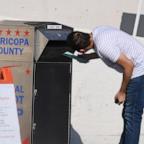Confidence Returns to 2007 Low, Spurred by Weak Buying Climate
April 24, 2007 — -- Consumer confidence returned to its 2007 low this week, with gasoline prices high and ratings of the buying climate at their lowest since October.
The ABC News/Washington Post Consumer Comfort Index stands at -7 on its scale of +100 to -100, matching its 2007 low for the second time in three weeks. It's fallen nine points from a 2007 high of +2 in mid March, in tandem with rising gas prices.
The CCI is calculated according to Americans' ratings of the national economy, the buying climate and their personal finances. Ratings of the buying climate lead the decline: Just 36 percent now rate it positively, down seven points in the last month.
High gas prices are likely the main culprit. After 11 weeks on the rise, gas now averages $2.87 a gallon in federal survey data, 20 cents from its record high in September 2005. Consumer confidence has historically been sensitive to rising fuel prices.
Things could be worse; while ratings of the buying climate have softened, incomes (given continued low unemployment) are pulling in a positive direction. Sixty-one percent rate their personal finances positively, up four points in the last two weeks.
In the CCI's remaining component, 43 percent rate the national economy positively, unchanged in the past month.
TREND -- Given competing positive and negative economic forces, confidence has wobbled the past two months, but with a generally downward trend. The CCI started March at -1, hit its yearly high of +2 the next week, only to be followed by a record-matching seven-point drop March 18.
It's averaged -3 so far this year, better than its average in weekly polls since December 1985, which is -9. Its record low was -50 in February 1992; its all-time high, +38 in January 2000.
GROUPS -- As usual, the index is higher in better-off groups; for example it's +48 among top-income Americans, while -49 among those with the lowest incomes and +4 among college graduates, while -15 among those who haven't finished high school.
The index also remains much stronger among Republicans (+38) than among independents (-15) or particularly among Democrats (-33). The current 71-point partisan gap is the largest since September 2006.




